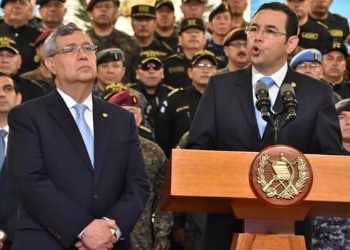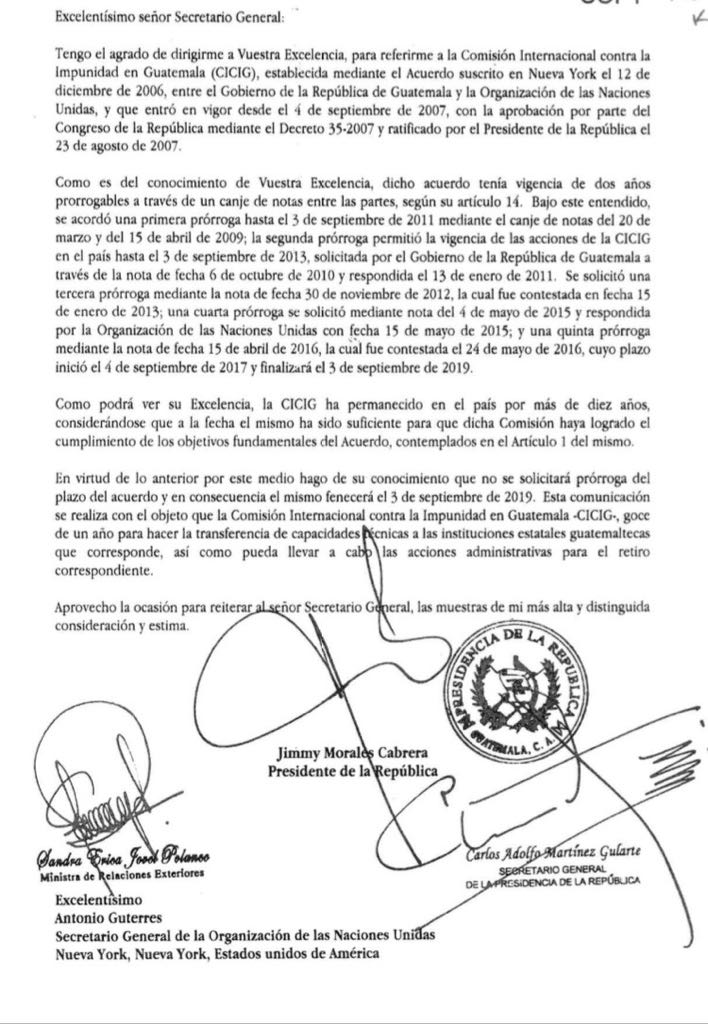In a bold move that may further stoke tension in his Central American nation, Guatemala President Jimmy Morales has announced that he will not renew the mandate for the country’s United Nations-backed anti-graft body amid investigations into him and his political party for alleged illicit campaign financing.
Flanked by members of his cabinet, as well as military and police officers, Morales announced August 31 that he will not ask the International Commission Against Impunity in Guatemala (Comisión Internacional Contra la Impunidad en Guatemala – CICIG) to continue working in the country.
In his short speech, Morales accused the commission of “sowing judicial terror in Guatemala,” by “violating our laws, inducing people and institutions to participate in acts of corruption and impunity,” and “selective criminal prosecution with an ideological bias.”
Since 2007, the CICIG has acted as an adjunct prosecutorial body, assisting the Attorney General’s Office on its most complicated cases involving government-related corruption and organized crime cases, including one that ended the presidency of Morales’ predecessor, Otto Pérez Molina in 2015.
In a letter sent to UN Secretary General António Guterres, Morales said the commission will have until September 2019 to “transfer technical capacities to the Guatemalan state institutions.”
(The letter sent to UN Secretary General Antonio Guterres)
Hours earlier, military jeeps with machine-gun turrets manned by masked soldiers surrounded the walled offices of the CICIG in the capital Guatemala City. They later dispersed without declaring their intentions or reasons for gathering at the compound, but few with any knowledge of Guatemala’s tormented history of military coups and counter-coups doubted the message.
Morales’ announcement comes as he and his National Convergence Front (Frente de Convergencia Nacional – FCN-Nación) political party are under investigation by the Attorney General’s Office for alleged illicit campaign financing during his 2015 bid for the presidency.
SEE ALSO: President Jimmy Morales’ (and Guatemala’s) ‘Original Sin’
For now, Morales is shielded from the investigation by presidential immunity. But following a petition by the Attorney General’s Office, a commission is currently working to determine whether or not there is enough evidence to remove the president’s immunity.
On August 30, Guatemala Minister of Foreign Affairs Sandra Jovel met with US Ambassador to the United Nations Nikki Haley, but it’s unclear if the United States knew that Morales was going to announce that he would not renew the CICIG’s mandate.
Shortly after the president’s announcement, the US Embassy in Guatemala issued a tepid statement, via Twitter, that the United States was “committed to fighting corruption and impunity.”
#EEUU está comprometido a luchar contra la #Corrupción e #Impunidad https://t.co/i1rMpUE0uu
— US Embassy Guatemala (@usembassyguate) August 31, 2018
InSight Crime Analysis
The move by Morales appears to be an effort to obstruct justice. While he did not mention the investigation into him and his political party’s finance structure in the 2015 campaign, the announcement to end the CICIG’s mandate will undoubtedly weaken the prosecutorial hand.
Most notably, the visa of CICIG Commissioner Iván Velásquez expires September 18. (Visas of several others expired August 31.) Velásquez, a Colombian judge, is a major part of the prosecutorial side of the CICIG and has the political capital to carry out an investigation that can topple a president. Morales has already tried to expel him from the country without success.
SEE ALSO: Guatemala News and Profiles
But establishing a firm date of departure — albeit a year in the future — and specifying that this period should be used to “transfer technical capacities” may be the argument the government uses to justify not renewing Velásquez’s visa, diplomatic sources in Guatemala told InSight Crime.
The fight is also personal for the president. In addition to inching closer to Morales, prosecutors have already pounced on Morales’ family and his allies for alleged corruption. The president’s announcement comes just days after one of his top military advisors, General Érick Melgar Padilla — the brother to FCN-Nación congressman and former security advisor to the president, Herber Armando Melgar Padilla — was arrested for obstructing justice in a separate case.
What remains unclear is the US position. In the past, the United States has stood firm, issuing public statements of support that specifically mention the CICIG by name and often position Velásquez next to the ambassador, as it did in a February tweet.
“#EEUU apoya con firmeza a la @CICIGgt y al Comisionado @Ivan_Velasquez_” #EmbArreaga pic.twitter.com/l2enWeu1Mc
— US Embassy Guatemala (@usembassyguate) February 6, 2018
But in recent months, important US conservatives in Congress have wavered on their support of the commission. Specifically, Senator Marco Rubio (R-FL) put a hold on $6 million in funding for the commission following unfounded accusations that the judicial body had unfairly targeted a Russian family in exile in Guatemala for obtaining false documentation from a criminal network.
The US government pays for just under half of the CICIG’s budget. But right now, its political capital may be more important than its money.
*This article was written with assistance from InSight Crime’s Felipe Puerta.


